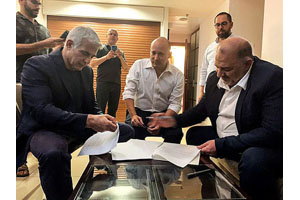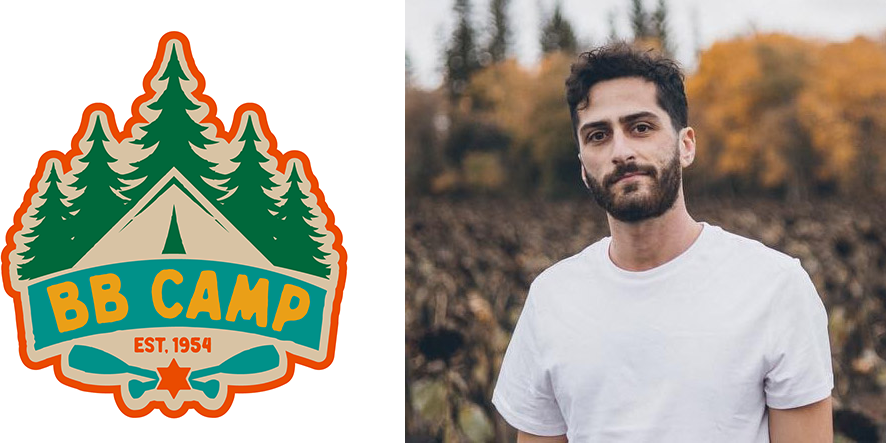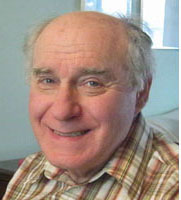Opinion
What coalition building in Israel is accidentally teaching us

By JAMIE MICHAELS The signatures are on paper. The ink is drying. The reign of King Netanyahu, Israel’s longest serving prime minster, may be at an end. The only guarantee in Israeli politics is that there are no guarantees—der mentsh trakht un Got lakht.
In the 11th hour, Yair Lapid, the leader of the aptly named “change government” declared to President Rueven Rivlin that he had succeeded in forming a government. Time will tell if he is correct. Lapid is stitching together unlike parts. He’ll need exactly the right amount of electricity to bring them to life.
Mansour Abbas is Israel’s most interesting dentist. For decades, Arab and Jewish political parties have lived in separate realities. Arab parties have rejected partaking in and normalizing a system they believe oppresses Arab and Palestinian voices. Jewish parties have had little interest in dialogue with Arab nationalists whom they view as existentially threatening to Israel’s Jewish identity. The impasse seemed unbridgeable. Luckily, Abbas is used to pulling teeth. His Ra’am party has left behind traditional divides, advocating for the interests of Arab-Israeli society as opposed to larger questions of Palestinian nationalism. Ra’am entered the Knesset on a platform of fixing infrastructure, tackling organized crime, and legalizing unrecognized Bedouin villages. If the change government is formed, Ra’am will be the first Arab party in the history of Israel to join a ruling coalition.
On Monday, June 7th the Knesset Speaker will schedule a potential swearing in, one the world will watch to see if the new government can pass a vote of confidence. The coalition’s margins—61 of 120 members of the Knesset—are beyond thin. The precariousness of the new government’s position is eclipsed only by the range of its members’ differences. Including Ra’am, the change government is comprised of eight parties that span the political spectrum, from the dovish Meretz to the hawkish Yamina. If Netanyahu can siphon a single vote, the country will be plunged into its fifth round of elections in four years.
The inclusion of Abbas in this government has not gone unopposed. Hundreds of picketers mobilized outside the hotel where the coalition negotiations took place, challenging the idea that an Islamist party should be part of government. What these protestors failed to realize is that Arab-Israelis comprise over 20% of the country.
For decades, their needs have been systemically ignored by the Jewish majority. Now, like the Haredim, they are learning to play politics. Ra’am supporters don’t want to push the Jews into the sea. They want new schools, upgraded roads, and equality under the law— and, if this new government actually takes root – they’re off to a roaring start. In the haggling over coalition building, Ra’am has secured a commitment of roughly 20 billion dollars (CD) in development funding to help level the playing field. Addressing long standing inequality in the Arab sector will create a safer and more secure Israel for all of its citizens.
The strangest accident of Israel’s unstable coalition system is that it’s making us talk to each other. You don’t need to be a yeshiva graduate to know that Israelites are a stiff-necked people. For the change government to succeed, both Jewish and Arab Israelis will need to turn their heads and listen. The quirks of coalition negotiations are demanding unprecedented conversations between disparate world views. Regardless of the necessity of circumstance, it’s an opportunity for dialogue—dialogue the country has been putting off for far too long. The potential departure of Netanyahu has already opened space for new voices. Paradoxically, Israel’s fractured electoral system may be the long-needed catalyst to begin the process of unifying the country’s disparate tribes. There will be portions of Ra’am’s platform that will be untenable for many Israelis. The same holds true for Yamina and Meretz. Listening to the ideas and policies of others, even those we will ultimately reject, holds value. At a societal level, coalition building is offering Israelis the chance to get to know each other. The success of Israel’s democracy depends on this process continuing to yield common ground. The only alternative—the perpetual ballot box—is no alternative at all.
Features
Did the Jewish Federation’s stepping in to force the firing of BB Camp co-executive director Jacob Brodovsky lead to the further alienating of many young Jews from the community?

(June 8, 2024) Introduction: We received the following email from a young Jewish Winnipegger re the BB Camp controversy, which we’ve reported on extensively on this website. We thought it important to post the email as a separate piece rather than as an add-on to an article in which we printed other emails from readers expressing their disappointment at what happened to Jacob Brodovsky, the former co-executive director of BB Camp:
Dear Mr. Bellan,
Thank you for once again cutting through the noise with your April 23rd column, “What the sordid BB Camp affair says about our community.” Your clarity and courage in calling out our rush to judgment and our narrowing definition of “Jewish identity” are deeply appreciated, especially by those of us who feel increasingly alienated in Winnipeg.
I also want to share a troubling observation about one of the loudest voices attacking Jacob Brodovsky: theJ.ca. Their articles—bylines like “Ron East” or “TheJ.ca Staff”—are, in fact, almost entirely generated by artificial intelligence. They contain no verifiable sourcing, frequently hallucinate details, and appear to be little more than a far-right newsletter running smear campaigns under the guise of “journalism.” The entire BB Camp series reads like an AI trained on extremist talking points, regurgitated daily to bully our community into silence.
As a young Jew in Winnipeg, I—and many of my peers—are horrified by the transformation we’re witnessing. What was once a warm, progressive community is now dominated by:
Bigots and Bullies: Parents threatening to pull their kids unless the camp bows to extremist demands.
Florida-style Republican Judaism: A narrow, intolerant ideology portrayed as the only “true” Jewishness.
Collapsing Leadership: Our Jewish Federation leaders, including Jeff Lieberman, have shown they lack the vision or backbone to navigate this crisis.
We stand at a dangerous inflection point. Our community is on the verge of a total and irreversible fascist takeover—an outcome no amount of regret or retrospective apologies can undo.
Please consider reading firsthand accounts from community members who have bravely spoken out:
I know this letter is anonymous and won’t be published, but I hope you see it as proof that many of us are desperate for ethical, forward-looking leadership. Thank you again for using your platform to remind us what Jewish community should mean: diversity of thought, compassion for all people, and the moral courage to call out extremism—no matter where it comes from.
This was NEVER a community of far-right Israelis. This is a shame beyond words.
With gratitude and urgency,
A Concerned Young Jew in Winnipeg
Post script: We had heard from many different sources (who all asked to remain anonymous) that the Jewish Federation’s decision to force the BB Camp board to fire Jacob Brodovsky came as a result of pressure from one or more big donors to the Combined Jewish Appeal. We sent an email to Jeff Lieberman, asking Jeff whether the Jewish Federation’s decision to force the resignation of Jacob Brodovsky as co-executive director of BB Camp came as a result of a donor (or donors) to the Combined Jewish Appeal threatening to withdraw their donation(s) this year unless Jacob were fired. I don’t think anyone would be surprised to learn that Jeff did not bother responding to my request for information.
The Jewish Federation used to advertise elections to its board in The Jewish Post & News for many years, but no longer does so (in the Jewish Post). Instead, it submits a slate of new appointees to its board to members of the current board to be rubber stamped. Is it any surprise that the donors who contribute the most money call the shots for the Federation (which is as its always been. The only difference is the Jewish Federation and the Winnipeg Jewish Community Council before it used to operate with a patina of democracy. Sadly, that is no longer the case.)
We would urge anyone on the Federation board who could give information about what led the board to force the resignation of Jacob Brodovsky to contact us. We would give full anonymity, as we have to the writer of the above letter.
-Bernie Bellan
Local News
Is It Alberta’s Turn to Regulate Online Gambling? Looking at the Possibilities

Online gambling and betting in Canada is booming, with each province allowed to regulate its own space. Ontario, Canada’s most populated province, turned two this year after leading the way in April 2022. In what should motivate Alberta and other provinces, Ontario is already reaping the rewards, generating $100 million annually in gambling revenue. Will the local administration in Alberta do what is needed?
Talks have been rife that Alberta is considering going the Ontario way by having an open-licensing system. In July 2023, the minister for Service Alberta and Red Tape Reduction, Dale Nally, issued a mandate to make this province a hub of online sports betting and gambling.
Alberta Premier Danielle Smith recently asked Nally to cooperate with indigenous partners and other stakeholders to develop an online gaming strategy. The main focus will be on revenue generation and responsible gambling. In light of this, Nally said Alberta’s primary focus is becoming a “leading hub for iGaming” with streamlined regulations and low corporate taxes. Such conditions should position Alberta to become a leading iGaming destination.
A few weeks ago, the minister attended the ICE international gaming conference held in London. Together with Ontario’s Attorney General, Doug Downey, and other stakeholders, Nally participated in a roundtable discussion regarding the status of iGaming in Canada. CDC Gaming Reports also revealed that the discussion highlighted the success of iGaming in Ontario and how Alberta can emulate this success story.
Looking into the Alberta Budget 2024, it’s evident that state monopoly could soon give way to Canadian casinos to thrive in the province. Alberta took the first baby steps towards a more liberal gambling sector after setting aside $1 million for gambling. This budget will support the looming review of the Gaming, Liquor, and Cannabis Act and supporting Regulation. The idea is to review the entire regulatory framework to find more funding ways for Alberta charities and community projects.
Major operators like BetMGM, PointsBet, and PokerStars have since hired lobbyists to ensure commercial operators become a reality in Alberta. Speaking to investors and industry analysts in March this year, PointsBet CEO Sam Swanell tipped Alberta and British Columbia to legalize online betting soon. He noted that this could provide the much-needed expansion of that TAM.
Alberta is yet to take full advantage of online gambling despite being the country’s fourth-largest province, with around 4.3 million people. Smaller markets in North America, such as West Virginia and Connecticut, are already benefiting from commercialized online gambling. The good news is that noises about legal online gambling are getting louder in Alberta. It’s just a matter of when the government will make the announcement.
What Next for Online Gambling and Betting in Alberta?
Including a $1 million gambling review budget is definitely a step in the right direction. However, there’s still much to do to end Alberta’s long-standing gambling status quo. But at least the budget opens the door for further discussions and reforms regarding iGaming in Alberta. That discussion has been underway, although the momentum has increased in the last year or so.
As it stands, PlayAlberta.ca is the only regulated online gaming platform in Alberta. It’s a government-run website operated by the AGLC (Alberta Gaming Liquor and Cannabis). Besides casino games, this website provides sports betting and lottery-style gaming experiences. The legal sign-up age on PlayAlberta.ca is 18 years.
For Albertans who prefer more gambling freedom, the government doesn’t restrict anyone from joining offshore operators. Most gaming sites operating in Alberta are licensed in Curacao, the UK, and Malta. Compared to PlayAlberta.ca, these websites provide a more extensive variety of games, rewards, and general experience.
In conclusion, it’s just a matter of when Alberta will introduce an open-licensing market. This approach has proved to be a success elsewhere, especially in Ontario. A recent Ipsos report in Ontario revealed that only 13.6% of the residents prefer to gamble on offshore websites. Alberta could soon follow this path, although there’s much work to do to realize this dream.
Opinion
Hamas savages make no distinction between Israeli Jews, Arabs

By MYRON LOVE I remember many years ago attending a presentation by Simon Wiesenthal, the world’s leading Nazi hunter, during which he made the point that the focus of Holocaust education should not be on the number six million – the number of estimated Jews who were murdered – but rather on the 12 million martyrs – including other targeted groups such as the Roma, people who were gay, the mentally and physically handicapped and the many great many Slavic people who were also murdered. After the Jews, the Slavs were next on the list.
By focusing strictly on Germans killing Jews, he observed, it became too easy to make it out to be only Germans versus Jews – thereby making it easier for Holocaust deniers and absolving the other European peoples who were complicit in the killings.
Similarly, while we naturally mourn our Jewish brethren who were so horribly slaughtered on October 7, we need to also bear in mind that Hamas made no distinction in its murderous rampage between Israeli Jews and Israeli Arabs or between Israelis and foreign workers.
In a posting for The Gatestone Institute on November 30, Israeli-Arab journalist Khaled Abu Toameh noted that he Hamas terrorists who attacked Israel on October 7 did not slaughter Jews alone. The terrorists also murdered and kidnapped scores of Muslim citizens of Israel, including members of the Bedouin community. The terrorists’ murder spree made zero distinction between young and old, Muslim and Jew.
“Scores of Arab Israelis were wounded, murdered or taken prisoner,” he reported.
One such brave individual was 23-year-old Awad Darawshe, an Arab-Israeli paramedic who was on duty at the music festival near Kibbutz Re’im, which was among the first locations under attack. When the medical staff on site were ordered to flee, he insisted on remaining behind to treat the wounded.
Abu Toameh suggests that the paramedic thought that because he was Arab, he could reason with the killers. He was murdered nonetheless.
Another courageous Arab-Israeli that the writer noted, 50-year-old Abed al-Rahman Alnasasrah, was murdered by Hamas terrorists when he attempted to rescue people from the music festival. He was married and a father of six children.
Fatima Altallaqat, 35, from the Bedouin village near Ofakim, was murdered while working with her husband near the city of Ofakim in southern Israel. She was a mother of nine children, the eldest nine years old.
Abu Toameh quotes her husband as saying: “We’re a religious Muslim family and she wore the traditional headdress of a devout woman. It is inconceivable they [Hamas terrorists] could not see who was inside [the car]. They were five meters away from her as they passed.”
Forty bullets were fired into her.
Abu Toameh further cites the comments of Suleiman Zayadneh, brother and uncle, respectively, to four of the Arab-Israeli hostages, who describes himself “as proud to be a Palestinian and Muslim”.
‘The people who came to shoot and kill — they know nothing of religion,” the writer quoted Zayadneh as saying. “These [Hamas] people came and killed left and right.”
Abu Toameh went on to reference the words of Nuseir Yassin, a video blogger with 65 million followers. Two days after the massacre, he wrote: “I realized that… to a terrorist invading Israel, all citizens are targets. More than 40 of them [the murdered] are Arabs. Killed by other Arabs. And I do not want to live under a Palestinian government. Which means I only have one home, even if I’m not Jewish: Israel…. So from today forward, I view myself as… Israeli first. Palestinian second. Sometimes it takes a shock like this to see so clearly.”
Abu Toameh reported that “there have been many storie about reciprocal inter-communal generosity and heroism in the aftermath of this national tragedy, and they create hope for the future”.
He quoted a statement by the Darwashe Family:
“We are very proud of Awad’s actions… This is what we would expect from him and what we expect from everyone in our family — to be human, to stay human and to die human.”
Abu Toameh also quoted Ali Alziadna, four of whose family members were kidnapped, as saying that he was “touched by the outpouring of support” by other Israelis.
“People from all over the country have come to hug and support our family,” Alziadna said. “The entire nation is one family now.”
Abu Toameh pointed out that many Arab citizens of Israel serve as IDF officers and policemen, risking their lives for their fellow Israelis. Many are serving at the front lines, saving lives.
Undoubtedly, Abu Toameh suggested, one of the objectives of the Hamas massacre, in addition to slaughtering as many Israelis as possible, was to thwart normalization between Israel and Arab countries, especially Saudi Arabia. Hamas may also have aimed to damage relations between Jews and Arabs inside Israel.
”The terror group was, without doubt, hoping that we would witness another cycle of violence between Jews and Arabs inside Israel, similar to that which erupted in May 2021,’ Abu Toameh posited. “Then, Hamas succeeded in inciting a large number of Arab citizens of Israel to take to the streets and attack their Jewish neighbors and Israeli police officers.
“This time, however, the Arab-Israelis have not heeded the calls by Hamas. One reason is that Arab-Israelis saw, with their own eyes, how Hamas terrorists make no distinction between Jews and Muslims.
“Hamas has repeatedly demonstrated that it cares nothing for the well-being of Arabs and Muslims. From their luxury homes and hotel rooms in the safety of Qatar and Turkey, Hamas leaders give the orders to attack Israel and then sit back and let the world weep over the destruction they wrought upon their own people.
“On October 7,” Abu Toameh concluded, “Hamas metaphorically shot itself in the foot by showing the world, with unfathomably ghoulish pride, by way of Go-Pro cameras and other self-documentation, that it has neither a religious nor a secular-humanist set of values. Perhaps the Palestinians in the Gaza Strip should look at the Arab citizens of Israel and note how they enjoy equal rights, democracy, freedom of speech and a free media. If Palestinians wish to live well, like the Arab-Israelis, this is the time for them to get rid of Hamas and all the terror leaders who, for seven decades, have brought them nothing but one disaster after another.”
It is too bad that so many gullible fools in our Western societies refuse to open their eyes to the truth.
